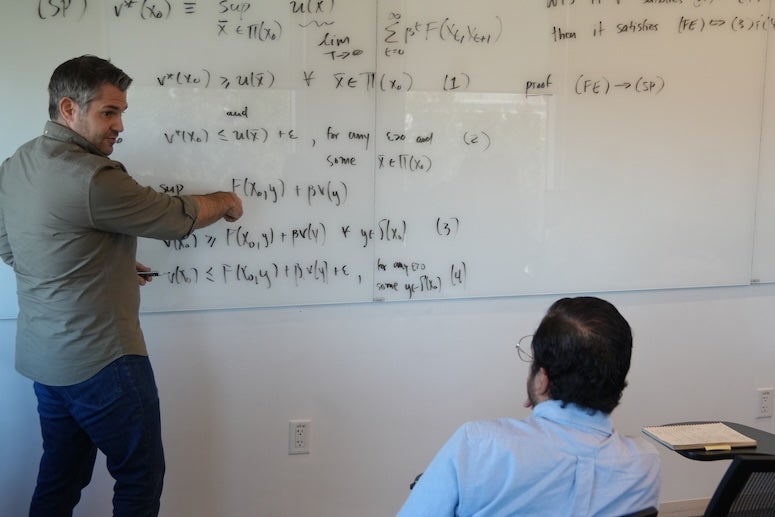After retiring from Ernst & Young following a 30-year career, Purvez Captain observed a growing gap among new recruits: while many understood economic principles, few possessed strong computational abilities needed to transform data into actionable insights. As a Rice University alumnus and advisor to the Department of Economics, Captain emphasized that students with robust coding and analytical skills consistently outperformed their peers.
This insight helped inspire the creation of Rice’s new Master of Computational Economics (MCEcon), a graduate program launching in fall 2026. Positioned at the intersection of economics, data science, and computational modeling, the degree places Rice among a select group of institutions offering advanced training in quantitative economic analysis.
Zach Bethune, associate professor of economics and director of the MCEcon program, explained that modern economic research demands more than theoretical knowledge. “Today’s practitioners must be able to code, process large datasets, and apply computational tools to test economic models,” he said. The curriculum emphasizes programming, data analytics, dynamic modeling, machine learning, and macroeconomic simulation, ensuring students gain hands-on experience.
Unlike traditional programs where computation plays a secondary role, this degree integrates it into the core. Faculty members, including Chase Coleman—a lecturer with active professional experience in computational economics—are designing applied courses that reflect real-world challenges. “We’re not training software developers,” Coleman clarified. “We’re preparing scientists who can use programming and data analysis to generate meaningful economic insights.”
The cohort-based structure ensures close mentorship, allowing students to work directly with researchers using computational methods in their work. The program also aims to strengthen ties between alumni and current students, fostering internships, mentoring, and recruitment opportunities.
Rachel Kimbro, dean of the School of Social Sciences, noted that the MCEcon reflects Rice’s commitment to aligning education with workforce needs. “Our goal is to combine rigorous economic theory with the technical fluency required in data-intensive careers,” she said. Bethune added that graduates equipped with economic reasoning, statistical precision, and computational proficiency will be highly sought after in both public and private sectors.
Captain praised the university’s responsiveness to employer feedback, stating that institutions must evolve curricula to keep pace with technological change. “Data analytics is reshaping every industry,” he said. “Rice is ensuring its students are ready to lead in this new environment.”
— news from Rice University
— News Original —
Rice leads way with new master’s degree in computational economics
When Purvez Captain retired after three decades at Ernst & Young, he noticed something about the new generation of interns and recruits who came through: They were sharp, they understood economics, but many lacked the computational tools necessary to turn raw data into decisions. n n“The students who came in with strong computational skills did very well,” Captain says, speaking today as a Rice University alumnus and longtime adviser to the Department of Economics. “Those who didn’t struggled. That’s what got us thinking — why not give Rice students that edge before they ever leave campus?” n nThat question helped spark the creation of Rice’s new Master of Computational Economics (MCEcon) — a graduate program that sits at the intersection of economics, data science and computation. Launching in fall 2026, the program positions Rice among the leading institutions offering this kind of quantitative economics and computation degree. n n“The landscape of economics is changing,” said Zach Bethune, associate professor of economics and director of the MCEcon program. “It’s not enough to know the theory — you have to be able to code, analyze data and use computational tools to test and apply that theory.” n nBethune says the new degree offers students the same rigorous foundation in economic theory and empirical methods as more traditional programs but with a distinctive emphasis on computation. “The computational aspect of this program isn’t a side project,” he adds. “The computational training is central. It’s about preparing students for how economics is actually done today.” n nThe curriculum will cover programming and data analytics, dynamic modeling, machine learning and macroeconomics and simulation. The cohort size will be intentionally small, allowing students to learn directly from faculty whose research uses computational methods. That includes Chase Coleman, a lecturer who joined Rice two years ago specifically to help design and teach the program’s applied courses. n n“We’re not turning students into software engineers — we’re turning them into scientists,” Coleman says. “In today’s world, scientists need to know how to program, analyze data and use those tools to generate insights.” n nColeman — who continues to work professionally in computational economics — says the program’s blend of coding, analytics and economic modeling will help graduates stand out in a rapidly evolving job market. “The space moves quickly,” he noted. “The techniques that mattered 10 years ago matter a lot less today. This program keeps students — and even us as faculty — at the forefront.” n nCaptain said what excites him most is Rice’s willingness to adapt based on alumni and employer feedback. “A good institution doesn’t just create a curriculum — it evolves it,” he said. “Data and analytics are changing everything about the job market. Rice is responding in a way that will prepare its students to lead.” n nRachel Kimbro, dean of the School of Social Sciences, said the MCEcon reflects Rice’s broader commitment to equipping students with the skills today’s employers demand. n n“Our faculty are designing programs that meet the realities of a rapidly changing workforce,” Kimbro said. “This one blends the strengths of Rice economics — rigorous theory and empirical training — with the computational fluency students need to thrive in data-driven careers.” n nThe program will also deepen collaboration between graduate alumni and current students, creating new mentoring, internship and hiring pipelines. n nFor Bethune, that partnership between theory and practice is exactly the point: “Students with this combination of skills — economic reasoning, statistical rigor and computational fluency — are going to be incredibly valuable. This program is about equipping them to lead in that future.”
